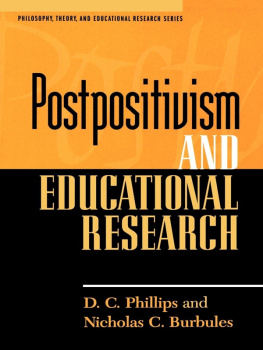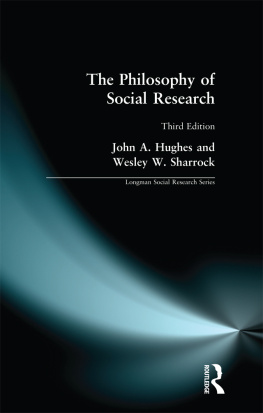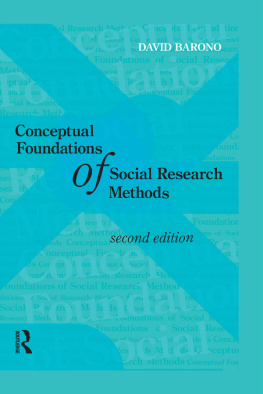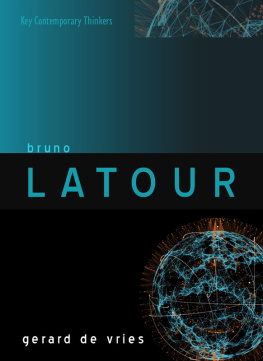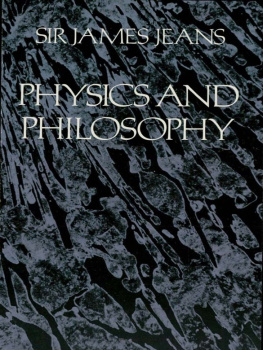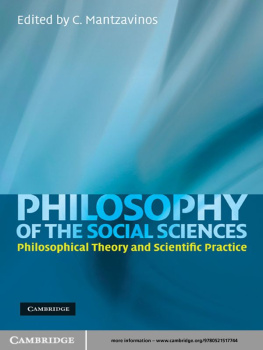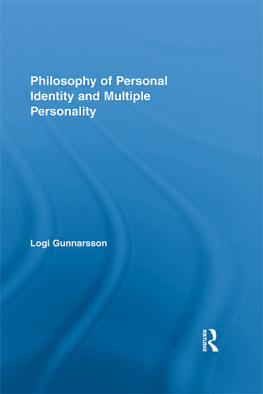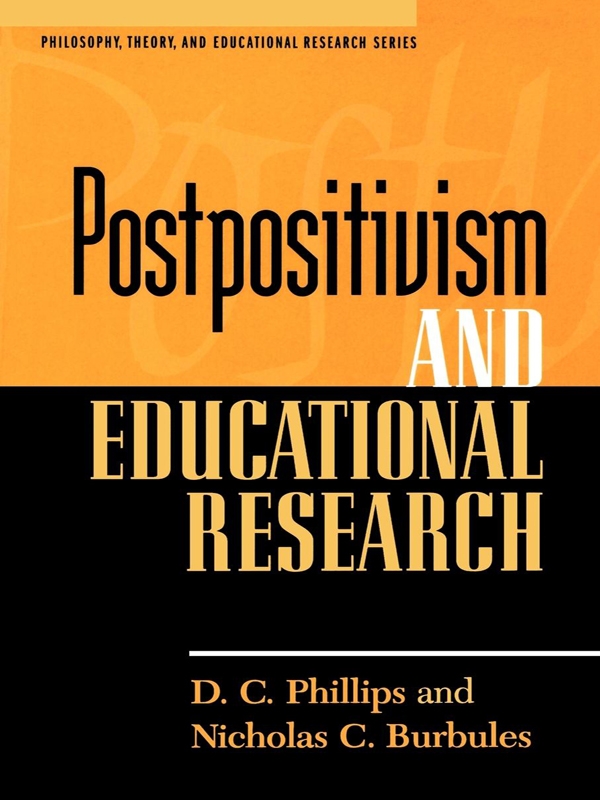T he authors of this book have been discussing the issues addressed within it with each other for two decades. For about the same period of time we have been discussingfrom a philosophical perspectiveissues that arise in the design and conduct of educational research with colleagues who are active researchers, and with graduate students in our classes who were about to become active researchers. We have profited enormously from the feedback we have received from these interactions over the years, and from the insights into the nuts and bolts of research that these others have shared with us. Either singly or together, we also have had lively discussions bearing on the topics in this book with philosophical friends and colleagues in the international community, and we are especially appreciative of the time we have spent talking with Harvey Siegel, Deborah Kerdeman, Nel Noddings, Robert Floden, James Marshall, and Michael Peters. Denis Phillips has had the opportunity to present workshops on this material to researchers and graduate students in Australia, New Zealand, Israel, Norway, Sweden and Switzerland, where he learned much from the somewhat different views and assumptions about educational research that are held there. Our wives, Valerie and Joyce, have been pillars of support but at the same time the friendliest of critics. Finally, we wish to thank Jill Rothenberg and Dean Birkenkamp of Rowman and Littlefield, who have encouraged and shepherded this project from its initial conception.
About the Authors
D. C. Phillips was born and educated in Australia, and moved to the United States in 1974; currently he is professor of education, and by courtesy, professor of philosophy at Stanford University (where he is also the Associate Dean for Academic Affairs in the School of Education). He was president of the Philosophy of Education Society during its golden jubilee year in 19901991; in 1993 he was Christensen Fellow at St. Catherines College, Oxford; and he is a Fellow of the International Academy of Education. He has authored, coauthored, or edited ten books and written more than a hundred journal articles and book chapters, which span educational research and evaluation methodology, philosophy of social science, philosophy of education, and history of nineteenth- and twentieth-century thought. He has given workshops on issues related to the present volume in the United States, Australia, Israel, New Zealand, Norway, Sweden, and Switzerland.
Nicholas C. Burbules is professor of educational policy studies at the University of Illinois, Urbana/Champaign. He has published numerous articles and several books in the areas of philosophy of education and educational policy. His recent books include Watch IT: The Promises and Risks of New Information Technologies for Education (Boulder, Colorado: Westview Press, forthcoming), written with Thomas A. Callister, Jr., and Globalization and Education: Critical Perspectives (New York: Routledge, forthcoming), co-edited with Carlos Torres. Currently he serves as editor of the journal Educational Theory.
What Is Postpositivism?
When I find myself in the company of scientists, I feel like a shabby curate who has strayed by mistake into a drawing-room full of dukes.
W. H. Auden
P oet W. H. Auden penned these words almost four decades ago, in an age that is long gone. Physicists and other natural scientists may still be regarded with awe, but there can be little doubt that social scientists have fallen from their pedestalif ever they occupied one! For the intervening decades have seen the rise to popularity of philosophical views that challenge the status of science as a knowledge-producing enterprise, and social scientists and educational researchers have been particularly vulnerable to these attacks. Scientistsaccording to these viewsare no less human, and no less biased and lacking in objectivity, than anyone else; they work within frameworks that are just that: frameworks . And, these critics suggest, none of these frames or paradigms, considered as a whole unit, is more justified from the outside than any other. Philosopher Paul Feyerabend even argued that the modern scientific worldview is no more externally validated than medieval witchcraft, and the prophet of postmodernism, Jean-Francois Lyotard, held that we should be incredulous about the story that is told to justify science as a knowledge-making frame (its justificatory metanarrative, as he termed it). If this general line of criticism is true of physics or medicine, it certainly should be true of social science, in which the values and cultural background of the researcher seem to play a more pervasive role. Thus a key question arises: Can this line of criticism, particularly in the case of educational research, be met? The present book is dedicated, if not to restoring social scientists and educational researchers to their pedestal, then at least to raising them above the mire. They may never be members of the nobility, but perhaps they can be located in the ranks of those with a modicum of respectability!
Educational researchers constitute a community of inquirers. Doing the best they can and (at their best) ever alert to improving their efforts, they seek enlightenment or understanding on issues and problems that are of great social significance. Other things being equal, does lowering class size for students in the lower elementary grades improve their learning of math and reading? Does it have an effect on their development of a positive self-image? Does bilingual education enable language minority students (or at least a significant number of them) to master English while maintaining their progress in other subjects such as science, math, and history? What are the features of successful bilingual programs? Are whole language approaches to the teaching of reading more successful than the phonics approach (and if so, in what respects)? Does either of these approaches have serious, unintended side effects? What effects do single-sex schools have on the math and science attainment of female students? Do they have other effects of which policy makers (and parents and teachers) ought to be aware? Does the TV program Sesame Street successfully teach young viewers such things as the alphabet, counting skills, and color concepts? Is it more successful than the instruction children can get from parents who, say, read books to them regularly? Does this program have an impact on the so-called achievement gap that opens up at an early age between many children from impoverished inner-city backgrounds and those from well-off middle-class suburban homes? Do Lawrence Kohlbergs stages of moral development apply to girls as well as to the boys whom Kohlberg studied? (Do they even hold true of boys?) Are multi-ability classrooms less or more effective in promoting learning of academic content than streamed classrooms? (And do they have positive or negative social and psychological effects on the students?) Are individual memories of childhood abuse (sexual or other), which are recovered many years later, to be trusted? Society generally, and educational practitioners and policy makers in particular, want to be guided by reliable answers to these and many other questions.
Many of us may have strong opinions about some of these issues; indeed, beliefs may be so strongly or fervently held that it seems inappropriate to call them merely opinionswe are convinced that our views are right . It is crucial for the theme of this book, however, to recognize that beliefs can be false beliefs . What appears to be enlightenment can be false enlightenment . Understanding can be misunderstanding. A position that one fervently believes to be trueeven to be obviously truemay in fact be false. Oliver Cromwell, the leader of the Roundheads in Britain (who executed King Charles I) and himself something of a fanatic, put this thought in memorable language: My brethren, by the bowels of Christ I beseech you, bethink that you might be mistaken (cited in Curtis and Greenslet 1962, 42). But unfortunately he apparently did not apply this moral to himself! Humorist H. L. Mencken put it a little less solemnly: The most costly of all follies is to believe passionately in the palpably not true. It is the chief occupation of mankind (cited in Winokur 1987, 31).

